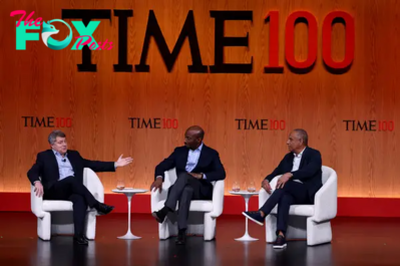Business
Europe's inflation held steady in August as European Central Bank keeps an open mind on rates
FRANKFURT, Germany -- Annual inflation held steady in Europe in August as food prices raced ahead of falling fuel costs, but there was no clarity about whether the European Central Bank will pause its record series of interest rate hikes.
The consumer price index for the 20 countries that use the euro currency was unchanged at 5.3% from the July reading, supported by food, alcohol and tobacco prices that increased a painful 9.8% since last August, according to official figures Thursday from EU statistics agency Eurostat.
Another key inflation number — so-called core inflation that leaves out volatile fuel and food — also eased in August, falling to 5.3% from 5.5%. That figure will be a key consideration for the ECB in deciding whether interest rates need to go higher or can remain unchanged while bank officials assess the impact of higher rates on growth.
Fuel prices fell 3.3% amid flat global oil prices and diminished summer demand for heating fuel.
European Central Bank President Christine Lagarde has said that the interest rate decision at the Sept. 14 policy meeting will depend on incoming data, a shift from a year-long series of meetings where rate increases had been announced ahead of time. The ECB must juggle fighting iNFLation with higher rates against the impact of costlier credit for consumers and Businesses.
Inflation has declined after hitting its peak in October at 10.6%, but the decrease has slowed in recent months and economists say the “last mile” toward returning inflation to the bank's 2% target may be the most difficult. One reason: unemployment remained at 6.4% in July, the lowest since the launch of the shared euro currency in 1999.
“We don’t think these data will tip the balance of opinion at the ECB decisively towards a hike or a hold,” said Jack Allen-Reynolds, deputy chief eurozone economist at Capital Economics.
Inflation is expected to resume its decline in coming weeks, but with unemployment at records lows and wage growth strong in the labor-intensive services sector, “we think that it will be a long time before services inflation falls to a level consistent with the ECB hitting its inflation target.”
INFLation has fallen to lower levels in the U.S. at 3.2%, but U.S. Federal Reserve Chair Jerome Powell has said more rate increases may be needed to return iNFLation to 2%. The Fed next meets on Sept. 19-20.
In Europe, recent growth indicators have been weak, while inflation has been steadily falling. Market indicators have suggested that participants are not convinced the ECB will hike again at the September meeting.
The eurozone economy stagnated with zero growth at the start of 2023 and saw a modest rebound in the second quarter, growing 0.3% over the quarter before. In August, the European Commission’s economic sentiment indicator combining measures of Business and consumer confidence fell to its lowest reading in 10 years excluding the pandemic, while purchasing managers' surveys indicate activity is slowing.
A key weakness in the eurozone has been its largest economy, Germany, which the International Monetary Fund forecasts to be the only major economy to shrink this year, down 0.3%.
The ECB's benchmark deposit rate stands at 3.75%, up from minus 0.5% in July 2022. The rapid series of increases is the fastest since the introduction of the euro as the bank combats inflation unleashed by higher oil and gas pries due to Russia's invasion of Ukraine, and by the rebound from the pandemic.
-

 Business36m ago
Business36m agoIdeas Wanted in Regards to a New Rail Trail in Beacon
-

 Business1h ago
Business1h agoCaitlyn Clark and breaking the glass ceiling for women in all sports – John Cardullo
-

 Business1h ago
Business1h agoIn the news… your quick look at the week ending April 27th
-

 Business6h ago
Business6h agoKen Chenault and Ken Frazier on the Challenge of Polarization Today
-

 Business7h ago
Business7h agoL.L. Bean Store Is About To Open In Kingston, New York
-

 Business13h ago
Business13h agoFire At Lower Hudson Valley Apartment Complex Displaces 50
-

 Business13h ago
Business13h agoWhat Was This Large Vessel Doing in Hudson River?
-

 Business15h ago
Business15h agoMarch 2024 insolvency statistics commentary – Mild on the finish of the tunnel however companies should train warning



























